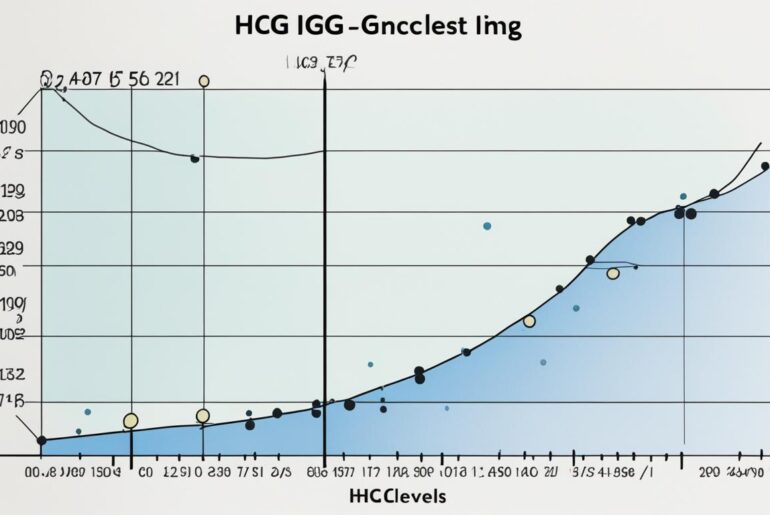Did you know that the levels of human chorionic gonadotropin (HCG) in the body can provide valuable insights into the health and progress of a pregnancy?
During pregnancy, the placenta produces HCG, a hormone that plays a crucial role in maintaining the pregnancy. HCG levels can be detected through urine and blood tests, and they undergo significant fluctuations throughout the pregnancy journey.
In this article, we will delve into the world of HCG levels, exploring their patterns, causes of fluctuations, and the implications of high and low levels. Whether you’re curious about HCG levels in early pregnancy or want to understand what tracking HCG levels entails, this comprehensive guide is here to provide you with the answers you’re looking for.
So let’s dive in and unravel the mysteries of HCG levels during pregnancy!
Key Takeaways:
- Human chorionic gonadotropin (HCG) is a hormone produced by the placenta during pregnancy.
- HCG levels fluctuate throughout pregnancy and can be detected through urine and blood tests.
- Abnormalities in HCG levels may indicate potential issues such as miscarriage, ectopic pregnancy, or gestational trophoblastic disease.
- Monitoring HCG levels can help healthcare providers assess the health and progress of a pregnancy.
- Understanding HCG levels is crucial for healthcare providers to provide appropriate care based on an individual’s circumstances.
What is hCG and how does it work?
Human chorionic gonadotropin (hCG) is a hormone produced by the placenta during pregnancy. Its primary function is to support the development of the embryo and maintain the pregnancy. HCG plays a crucial role in the early stages of pregnancy by stimulating the production of progesterone, a hormone that is essential for the maintenance of pregnancy.
HCG can be detected in urine tests, such as home pregnancy tests, as well as in blood tests performed by healthcare providers. These tests are used to determine if a woman is pregnant and to assess the progress of the pregnancy. Urine tests can provide a quick and convenient way to confirm pregnancy at home, while blood tests performed by healthcare providers offer more accurate and quantitative information about hCG levels in the body.
In addition to supporting pregnancy, hCG also plays a role in promoting the development of blood vessels in the uterus. This is important for providing adequate oxygen and nutrients to the developing embryo.
“HCG is a key hormone in pregnancy that helps maintain the pregnancy and supports the growth and development of the embryo.”
Understanding hCG and its role in pregnancy is crucial for healthcare providers to monitor the health and progress of a pregnancy. By measuring hCG levels, healthcare providers can detect potential complications, such as miscarriage or ectopic pregnancy, and provide appropriate care.
Normal HCG levels during pregnancy

The levels of hCG during pregnancy can vary widely between individuals. However, there is a general pattern of hCG levels rising in the first trimester and peaking around 10 weeks of gestation. After the peak, hCG levels gradually decline and stabilize.
During the first trimester, the exact levels of hCG can vary depending on the stage of pregnancy. In the fourth week, the normal hCG levels can range from 0-750 U/l. By the fifth week, the levels typically increase to a range of 200-7,000 U/l. In the sixth week, hCG levels can be between 200-32,000 U/l.
From weeks 8-12, hCG levels continue to rise, with a range of 32,000-210,000 U/l. During weeks 13-16, hCG levels can range from 9,000-210,000 U/l. In the later weeks of pregnancy, typically after the first trimester, hCG levels tend to stabilize and range from 1,400-60,000 U/l.
Causes of HCG level fluctuations
HCG levels in pregnancy can fluctuate due to various reasons, indicating potential complications or abnormalities. Understanding the causes of these fluctuations is essential for healthcare providers to assess the health and progress of a pregnancy.
Low HCG Levels:
Low HCG levels may occur in certain circumstances, such as an early pregnancy or a pregnancy that is ending in a miscarriage. Other causes of low HCG levels include:
- Blighted ovum: When the fertilized egg fails to develop properly, resulting in an empty gestational sac.
- Ectopic pregnancy: Where the embryo implants outside of the uterus, most commonly in the fallopian tube.
- Inaccurate estimation of gestational age: Leading to lower than expected HCG levels.
High HCG Levels:
Extremely high HCG levels, greater than 100,000 U/l, can be indicative of abnormalities such as:
- Gestational trophoblastic disease: A group of rare tumors that develop from the cells that would typically form the placenta during pregnancy.
- Placental tumor: A growth or abnormality in the placenta.
- Molar pregnancy: A rare condition where a non-viable pregnancy forms a mass of abnormal tissue inside the uterus.
HCG levels can also be higher in pregnancies with multiples, such as twins or triplets.
Ensuring appropriate management and further examinations are conducted when experiencing high or low HCG levels during pregnancy is essential. Healthcare providers will assess the specific circumstances and provide the necessary care based on individual needs.
Monitoring HCG levels during pregnancy

During a pregnancy, it is essential to monitor the levels of human chorionic gonadotropin (HCG) to ensure the health and progress of both the mother and the developing baby. Healthcare providers utilize various methods to monitor HCG levels, including urine tests, blood tests, ultrasound scans, and pelvic exams.
Urine Tests
Home pregnancy tests are commonly used to detect the presence of HCG in the urine. While they provide a quick indication of pregnancy, these tests do not provide specific information about the exact levels of HCG. They simply detect its presence or absence.
Blood Tests
Healthcare providers can perform blood tests to measure HCG levels more accurately. Blood tests help determine the concentration of HCG in the bloodstream, allowing for a more precise assessment of pregnancy progress. This information can be especially important in cases where HCG levels need to be carefully monitored due to medical conditions or previous complications.
Ultrasound Scans
In addition to urine and blood tests, ultrasound scans play a vital role in monitoring HCG levels during pregnancy. Ultrasound technology allows healthcare providers to visualize the development of the fetus and track its growth. By combining ultrasound findings with HCG level measurements, healthcare providers can evaluate the overall health and progress of the pregnancy.
Pelvic Exams
Pelvic exams are another essential tool for monitoring HCG levels during pregnancy. These exams involve a physical examination of the reproductive organs to assess the overall health of the mother and the growing fetus.
It is important to note that trends in HCG levels over time are more significant than the specific numbers themselves. Healthcare providers generally look for consistent patterns of HCG level progression to determine the health of the pregnancy. Typically, multiple measurements taken at least 48 hours apart are necessary to accurately assess the progress of the pregnancy.
By monitoring HCG levels through a combination of urine tests, blood tests, ultrasound scans, and pelvic exams, healthcare providers can gain valuable insights into the well-being of both the mother and the baby. This comprehensive approach ensures that any potential complications or issues are detected and addressed promptly, allowing for appropriate care and management throughout the course of the pregnancy.
Implications of low HCG levels in pregnancy
Low HCG levels during pregnancy can indicate potential complications. It may suggest an early pregnancy or a pregnancy that is ending in miscarriage. Other possible causes include blighted ovum or ectopic pregnancy. Inaccurate estimation of gestational age can also lead to lower HCG levels. Additionally, low HCG levels may be associated with decreased fetal growth and lower birth weight. Healthcare providers will need to evaluate the specific circumstances and conduct further examinations to determine the cause of low HCG levels and the appropriate course of action.
Complications Associated with Low HCG Levels
Low HCG levels in pregnancy can have important implications for both the mother and the developing fetus. Some of the potential complications associated with low HCG levels include:
- Miscarriage: Low HCG levels may indicate an impending miscarriage, especially if accompanied by symptoms such as vaginal bleeding and abdominal cramps.
- Fetal Growth Restriction: Inadequate levels of HCG can affect fetal growth and development, potentially leading to lower birth weight and other complications.
- Gestational Age Estimation: Accurate estimation of gestational age is important for proper prenatal care. Low HCG levels can make it difficult to determine the exact gestational age of the pregnancy.
It is essential for healthcare providers to evaluate the specific circumstances and conduct further examinations to determine the cause of low HCG levels and develop an appropriate management plan for each individual case.
Monitoring and Treatment
When low HCG levels are detected during pregnancy, healthcare providers will typically monitor the situation closely through a combination of blood tests, ultrasound examinations, and other diagnostic tools. Additional tests and assessments may be performed to determine the cause of the low HCG levels and identify any associated complications. The appropriate course of treatment will depend on the specific circumstances. In some cases, close monitoring and supportive care may be sufficient, while in others, more intervention may be required.
Implications of high HCG levels in pregnancy

High HCG levels during pregnancy can have various implications. It may indicate the presence of multiples, such as twins or triplets. In some cases, high HCG levels may be associated with a higher chance of Down syndrome, although further testing is necessary to confirm this. Additionally, high HCG levels can be a sign of gestational trophoblastic disease, which involves abnormal growth of cells in the uterus. Preeclampsia, a pregnancy-related condition characterized by high blood pressure and swelling, may also be associated with high HCG levels.
When high HCG levels are detected, healthcare providers will conduct further evaluations and tests to determine the cause and provide appropriate management. It is important to understand that high HCG levels alone are not conclusive evidence of any specific condition or complication. Healthcare providers will consider the overall clinical picture, including symptoms, medical history, and additional diagnostic tests, to make an accurate diagnosis and provide the necessary care.
It is worth noting that while high HCG levels can be a cause for concern, they do not automatically indicate a negative outcome. With proper monitoring and medical care, many women with high HCG levels go on to have healthy pregnancies and deliver healthy babies.
Conditions Associated with High HCG Levels in Pregnancy
| Condition | Description |
|---|---|
| Multiples (twins, triplets, etc.) | High HCG levels may indicate the presence of multiple embryos. |
| Down syndrome | While high HCG levels may be associated with an increased risk, further testing is needed for a definitive diagnosis. |
| Gestational trophoblastic disease | Abnormal growth of cells in the uterus, potentially leading to the formation of tumors. |
| Preeclampsia | A pregnancy-related condition characterized by high blood pressure and swelling. |
It is important for pregnant individuals with high HCG levels to work closely with their healthcare providers. Together, they can monitor the pregnancy, perform necessary tests, and ensure appropriate care is provided to manage any potential complications. With early detection and proper management, the majority of pregnancies with high HCG levels have positive outcomes.
Health conditions associated with high HCG levels

In addition to pregnancy, high hCG levels can be associated with certain health conditions. Elevated hCG levels may indicate the presence of cancer, such as cancer of the liver, stomach, pancreas, lung, breast, or skin. Furthermore, high hCG levels can be observed in individuals with liver disease, including cirrhosis. Additionally, germ cell tumors of the ovaries and testicles, which can be benign or malignant, may lead to high hCG levels. Moreover, individuals with inflammatory bowel disease or stomach ulcers may also exhibit elevated hCG levels. Regular monitoring of hCG levels, along with other diagnostic tests, can assist healthcare providers in identifying and managing these underlying health conditions.
Normal hCG levels in non-pregnant individuals and males

In non-pregnant individuals and males, hCG levels are typically undetectable or very low. However, higher-than-normal levels of hCG in non-pregnant females and males can indicate underlying health conditions. These health conditions may include certain cancers such as liver, stomach, pancreas, lung, breast, or skin cancer, as well as germ cell tumors, cirrhosis, stomach ulcers, inflammatory bowel disease, and fertility issues.
Healthcare providers may use hCG measurements, along with other diagnostic tests, to assess and manage these health conditions. Monitoring hCG levels can provide valuable information in the diagnosis and treatment of these conditions.
It is important for non-pregnant individuals and males with abnormal hCG levels to seek medical attention. A healthcare professional can conduct further evaluations and tests to determine the cause of the high hCG levels and provide appropriate management.
Understanding hCG levels and their implications in non-pregnant individuals and males is essential for healthcare providers to identify and address underlying health conditions, including cancers and fertility issues.
Health Conditions Associated with High hCG Levels
| Health Condition | Associated with high hCG levels |
|---|---|
| Certain Cancers | Liver, stomach, pancreas, lung, breast, skin |
| Germ Cell Tumors | Benign or malignant |
| Cirrhosis | – |
| Stomach Ulcers | – |
| Inflammatory Bowel Disease | – |
| Fertility Issues | – |
It is crucial to consult a healthcare professional if you have concerns about abnormal hCG levels, as they can help provide proper evaluation, diagnosis, and treatment for underlying health conditions.
When to seek medical attention

It is crucial to prioritize seeking medical attention in specific circumstances related to hCG levels. If you are pregnant and experience vaginal bleeding or abdominal cramps, it is important to consult your healthcare provider immediately. These symptoms can indicate potential complications that require prompt evaluation and management.
Moreover, if you are having difficulty conceiving or suspect underlying health conditions that may affect your fertility, seeking medical attention is vital. A healthcare professional can assess your situation and provide appropriate guidance and treatment options.
In addition, certain symptoms may be indicative of potential cancer and should not be ignored. If you experience unexplained weight loss, changes in bowel movements, or notice blood in urine, stool, vomit, or phlegm, it is crucial to consult a healthcare professional for further evaluation. Additionally, persistent symptoms such as a cough, breathlessness, or chest pain should not be overlooked and should prompt a visit to a healthcare provider.
In any of these situations, seeking timely medical attention will ensure proper evaluation, diagnosis, and appropriate management to safeguard your health and well-being.
Conclusion
Understanding hCG levels and their fluctuations during pregnancy is crucial for healthcare providers to monitor the health and progress of a pregnancy. Normal hCG levels can vary widely between individuals, but there is a general pattern of rise and decline during the first trimester. Fluctuations in hCG levels can indicate potential complications such as miscarriage, ectopic pregnancy, or gestational trophoblastic disease. Monitoring hCG levels, along with other diagnostic tests and imaging, can help healthcare providers identify and manage these complications.
Additionally, high or low hCG levels in non-pregnant individuals and males can be associated with underlying health conditions. It is important to seek medical attention if there are any concerns or symptoms related to hCG levels. Healthcare providers play a key role in assessing hCG levels and providing appropriate care based on the individual’s circumstances.
FAQ
What is hCG and how does it work?
Human chorionic gonadotropin (hCG) is a hormone produced during pregnancy by the placenta. It plays a crucial role in maintaining pregnancy and can be detected in urine and blood tests.
What are normal HCG levels during pregnancy?
HCG levels rise in the first trimester and peak around 10 weeks before gradually declining. The exact levels can vary, but for a typical pregnancy, hCG levels can range from 0-750 U/l in the fourth week, 200-7,000 U/l in the fifth week, and 200-32,000 U/l in the sixth week. From weeks 8-12, hCG levels can range from 32,000-210,000 U/l, and from weeks 13-16, levels can range from 9,000-210,000 U/l. In the later weeks of pregnancy, hCG levels can range from 1,400-60,000 U/l.
What causes HCG level fluctuations during pregnancy?
Fluctuations in hCG levels can indicate potential issues such as miscarriage, blighted ovum, ectopic pregnancy, or gestational trophoblastic disease.
How are HCG levels monitored during pregnancy?
Healthcare providers can monitor hCG levels through urine tests, blood tests, ultrasound scans, and pelvic exams.
What are the implications of low HCG levels in pregnancy?
Low hCG levels can indicate potential complications such as early pregnancy loss, blighted ovum, ectopic pregnancy, or inaccurate estimation of gestational age.
What are the implications of high HCG levels in pregnancy?
High hCG levels can indicate the presence of multiples, such as twins or triplets, and may be associated with a higher chance of Down syndrome or gestational trophoblastic disease.
Are high HCG levels associated with any health conditions?
Yes, high HCG levels can be associated with certain cancers, such as liver, stomach, pancreas, lung, breast, or skin cancer, as well as germ cell tumors and cirrhosis.
What are normal hCG levels in non-pregnant individuals and males?
In non-pregnant individuals and males, hCG levels are typically undetectable or very low.
When should I seek medical attention regarding HCG levels?
It is important to seek medical attention if you experience vaginal bleeding or abdominal cramps during pregnancy, have difficulty conceiving, suspect underlying health conditions, or have symptoms that may indicate potential cancer.
What is the importance of understanding HCG levels during pregnancy?
Understanding HCG levels and their fluctuations is crucial for monitoring the health and progress of a pregnancy and identifying potential complications or underlying health conditions.




